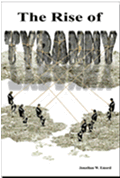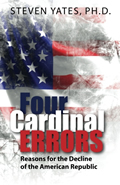MATERIALISM
PART 2 of 4
By Professor
Steven Yates
January 2, 2016
NewsWithViews.com
“Same
old song, just a drop of water in an endless sea
All we do crumbles to the ground although we refuse to see.
Dust in the wind
All we are is dust in the wind.”
~Kansas, “Dust in the Wind” (1977)
I’ve always enjoyed progressive rock, even if it raises my Christian friends’ brows sometimes. Much of it is well done, and sounds like some thought went into it. As implied by my referencing Madonna at the outset, popular music is often a good guide to the zeitgeist of a culture. Many singers/songwriters are sensitive to this in ways academics are not. Our cultural worldview, as I’ve emphasized, is fundamentally materialist, and even those uninterested in the philosophical specifics laid out in Part One will find themselves immersed in its consequences, one of which is the exclusive preoccupation with material goods amidst ethical ambiguity. One of the questions underwriting this ambiguity was best put by one of the first philosophy professors I was a teaching assistant for, back in the early 1980s. Are there any absolute values? was the question she posed in class. Must we rest content with the relativism of the anthropologists?
The German philosopher Immanuel Kant (1724 – 1804) believed we could deduce absolute duties from Pure Reason, and they would apply to all rational beings. He called his main principle the categorical imperative: always act as if the maxim or principle guiding your action could apply to everyone (I am paraphrasing, of course). Always tell the truth out of respect for the truth and respect for others as moral agents. Always keep your promises out of the same respect. Honor contracts. What is morally wrong is making exceptions for oneself, or treating oneself as a special case. Morality is universal or it is useless. Kant had problems, however, when universal duties appeared to conflict, as they sometimes did.
Great Britain’s John Stuart Mill (1806 – 1873), a Utilitarian, argued that morality is a matter of following the greatest happiness principle: your action is ethical if it creates a greater balance of happiness over unhappiness in the world, where happiness tends to mean pleasures of various sorts (those of the mind, such as scientific knowledge or appreciation of the arts, take precedence over those of the body, involving sensuality and appetites). This kind of position logically permits the sacrifice of some if it brings about enough knowledge and social benefits for the rest to enjoy a greater balance of happiness. And by the way, these are not idle games played by intellectuals locked away in academic cubicles. Mill’s ideas were widely studied and absorbed into governing bodies throughout the English-speaking world. They came to affect policy decisions in a variety of arenas, and were furthered by people who barely even heard of Mill himself. The sacrifice of dozens of black men in Macon Co., Ala., during the Tuskegee syphilis experiment is consistent with utilitarian thought! The public health community got away with this for decades! Also compatible with utilitarianism is every decision to send the children of the masses to fight wars of choice!
So is it the case that, as Russian novelist Fyodor Dostoevsky’s (1821 – 1881) character Ivan Karamazov put it, “If God does not exist, then everything is permitted”? Twentieth century secular ethics has been a struggle against this wretched conclusion, as well as against the relativism of anthropologists such as Benedict. Thus far, the results are less than promising!
A few major thinkers of the later twentieth century weighed in with fresh proposals. Among the best known is John Rawls (1921 – 2002), who pursued a theory of social justice as fairness. He sought to identify rules that would be adopted by rational persons from behind a veil of ignorance: that is, from an ideal vantage point where the adopter does not know his race or class standing or other particulars. What principles would be most worth embracing by the rational and fair-minded? Rawls’s answer: every person should have basic liberties no government can take away, to the extent compatible with equal liberties for all (the liberty principle); “offices and positions” should be open to all persons regardless of race and sex (an equality of opportunity principle); inequalities, to be acceptable, must work to the advantage of the worst off (the difference principle).
Rawls’s critics noted that his original position (behind the veil of ignorance) works under the assumption that most people are risk averse. They would not want to risk the results of principles that left disadvantaged groups to fend for themselves, as they might be in one such group. Saying this is a bit strange, however, and others wondered if the thought experiment was realistic. Can anyone actually imagine themselves behind a “veil of ignorance”? It certainly doesn’t comport with the identity-politics that has come about since Rawls wrote his major work A Theory of Justice (1971). Rawls did not see any connection between morality and justice on the one hand and metaphysics or worldviews on the other. The idea that these areas can be divorced from one another is part of secular ethics in the material world.
One of Rawls’s Harvard colleagues, Robert Nozick (1938 – 2002), developed an individualist ethic, as have other notable libertarian philosophers such as Tibor R. Machan (1939 – ), some influenced by Ayn Rand (1905 – 1982). They focused instead on negative rights of individuals, rights to be left alone in ways that imply no duties to others except to leave them alone. These they contrasted with supposed positive rights to specific goods someone is obligated to supply, which led to collectivism. Their view was that all individuals have the right to act freely, pursue their own goals, and keep the fruits of their labors (private property) so long as they do not interfere with the same negative rights of others. All should deal voluntarily with one another in the free market. According to the non-aggression principle, central in the libertarian ethos, what is forbidden is physical aggression or coercion against others.
This
view appeals to defenders of freedom and Constitutionally limited government,
obviously, since to the libertarian government is the primary aggressor
against individuals’ rights, to be kept very small (minarchism,
what Nozick called the night watchman state) or eliminated (anarchocapitalism),
therefore. The downside is that individuals rendered helpless or infirm,
e.g., by illness or infirmity late in life, would have no inherent right
to care, as that would be a positive right. For libertarian purists, even
social security is the collectivized and forcible taking from some and
giving to others. Negative rights do not do you much good, however, if
all they come down to is a “right” to starve, or to die helpless.
Families are considered responsible for helping their own, but reality
is that in industrial civilization family members have had to spread everywhere
in search of work, often leaving elderly parents behind.
Nothing in libertarianism forbids a person from acting on his own to help,
e.g., Alzheimer’s patients who are alone. This is hardly reassuring,
though. An ethic of purely negative rights seems neither realistic nor
humane. Libertarians assumed, moreover, that free market dynamics plus
what Nozick’s night watchman state would be sufficient to control
corporate greed or prevent the dominance of the state by corporations
acting in consort as they hungered after power. History suggests that
this is wrong, that the locus of power is not government per se but networked
corporate leviathans who can buy political loyalty. One need only read
John Perkins’s (1945 – ) Confessions of an Economic Hit
Man (2004) to see the role corporations have played in controlling
governments and bringing about a wide variety of regime changes and cultural
catastrophes against those who resisted.
While all these various notions have all received great discussion and debate, no one position has emerged as dominant. Richard Rorty (1931 – 2007), arguably the last major philosopher of the twentieth century (and possibly the last major philosopher the West will produce), put it like this in his Consequences of Pragmatism (1982): again to paraphrase, in the actual world, people have the rights and obligations society says they have, no more and no less. We are back to the anthropological view. Society, neither Rorty nor they quite tell us, devolves upon authority, especially those with the capacity to enforce their will on others, or to use language in ways ensuring psychological conditioning and de facto control. One of Rorty’s favorite philosophers was educationist John Dewey (1859 – 1952). Dewey, who had studied under Wundtian G. Stanley Hall whom we mentioned earlier, had also seen merit in behaviorism.
All of the philosophers we have considered were atheists except for Kant who believed society benefited from a general belief in God, although from a philosophical standpoint Kant decoupled God from morality. Later philosophers just built on this separation. Kant did not believe our reason was capable of solving the problem of whether or not God exists; its categories, Kant called them, limited its possibilities.
But we cannot really evade the choice: believe in God and His commands, or not? To not choose is to be an operational atheist, acting as if God does not exist while going along with what is fashionable, ethically speaking.
|
|
Rorty’s implicit answer to Dostoevsky is: “If God doesn’t exist, then everything is permitted that your fellows allow, the state permits, or that you can get away with.” The infamous “eleventh commandment”: thou shalt not get caught. If your culture has not convinced you that you shouldn’t lie, cheat, steal, or go on stage and perform nearly naked (think Miley Cyrus!), then so much the worse for your culture! Any ethical objections to the idea that corporations may do as they please and call it “the free market at work” turn out to be toothless.
Next week part three.
Click here for part -----> 1, 2, 3, 4,
� 2016 Steven Yates - All Rights Reserved
Steven Yates has a Ph.D. in philosophy and is the author of Four Cardinal Errors: Reason for the Decline of the American Republic (2011) and Philosophy Is Not Dead: A Vision of the Discipline’s Future (ebook, 2014). He blogs occasionally at WorldPress.com. He lives in Santiago, Chile with his wife and two spoiled cats, and is working on his own online education project, the New Lyceum Academy for Philosophical Studies (website forthcoming).
E-Mail: freeyourmindinsc@yahoo.com















 Share
This Article
Share
This Article





